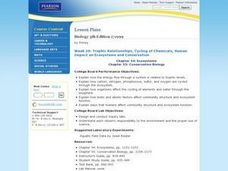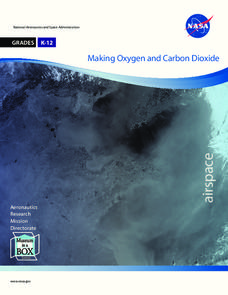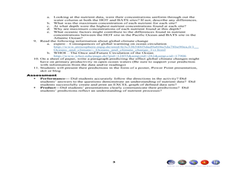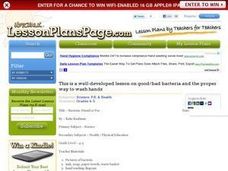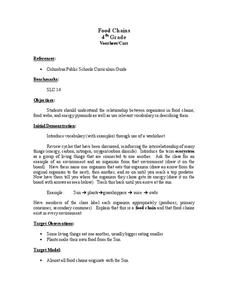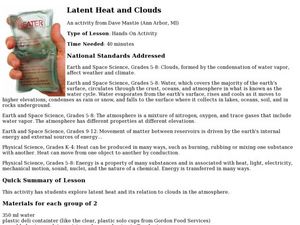Curated OER
Chemistry and Commercial Fertilizers
Pupils listen as the teacher lectures about the history of commercial fertilizers. The lesson includes extensive information for the teacher. Following the lecture, students complete a worksheet titled "Nitrogen Cycle Problems." The...
NOAA
The Dead Zone
The fifth installment of a 23-part NOAA Enrichment in Marine sciences and Oceanography (NEMO) program defines dead zones and how they form. Pupils then examine data from the Gulf of Mexico to determine dead zone formation.
Curated OER
Hopper Hunt: IPM Decision-making in Alfalfa
Students describe migrations and life cycle pattersn of a key alfalfa pest, the Porato Leafhopper. They define the Economic Inquiry Level and Economic Threshold. Students evaluate data in relation to profit as it applies to IPM. They...
Curated OER
Rosa Parks Community Garden
Students explore gardening and nutrition in the Rosa Parks Community Garden. They work in stations to discuss food choices, the life cycles of plants, and mini-composting. After starting in one station, they rotate to try each activity.
Curated OER
Cycles Review
Eighth graders discuss the four major cycles of matter. In this general science lesson, 8th graders decide which of the four is the most important. They share their opinion in class.
Curated OER
Trophic Relationships, Cycling of Chemicals, Human Impact on Ecosystems and Conservation
Students explore how the energy flow through a system is related to trophic levels. They investigate how organisms affect the cycling of elements and water through the biosphere. Students participate in lab activities to observe ways...
Curated OER
Nitrogen Fixation, OR What a Gas!
Students gain skill in the design, implementation, and reporting of a scientific research project using the scientific method. They set up an experiment to determine the effect of adding the Rhizobium bacteria to one group of legume...
Curated OER
Recyclers Revisited
Fifth graders observe their plant experiments that they started in a previous lesson and examine the role of decomposers in the nitrogen cycle. Two weeks after they set up a worm terrarium, they analyze any changes they observe, and...
NASA
Making Oxygen and Carbon Dioxide
Some like it hot! Scholars observe both exothermic and endothermic reactions as part of the carbon dioxide oxygen cycle. First, scientists demonstrate (or watch) a chemical reaction to create pure oxygen using fire for confirmation....
Curated OER
The "Coal LIfecycle" Scrapbook
Students discover how coal is formed. For this science lesson, students create a scrapbook on the life cycle of coal and show how coal is formed by showing pictures of each stage.
Curated OER
Introduction To Brine Shrimp
Fourth graders engage in a variety of activities in order to find information about the brine shrimp. The instructional activity includes background information for the teacher to deliver instruction. They make observations of the shrimp...
Curated OER
Bats and Hot Dogs
Students identify patterns and relationships from data that is collected and solve variables. In this investigative lesson students study ocean productivity, the nitrogen cycle and phytoplankton then answer questions.
Curated OER
Land Use and Nitrogen
Students consider the effects of development on water quality. They test nitrogen levels in waters before and after development, investigate wastewater treatment options and research best management practices to reduce nitrogen loads.
Curated OER
The Marvels of Mud
Young scientists roll up their sleeves and get a little dirty in this three-day earth science investigation. Following the scientific method, children monitor the growth of algae in pond water samples in order to determine the role that...
National Wildlife Federation
Why All The Wiggling on the Way Up?
Some of the CO2 emitted by burning fossil fuels is removed from the atmosphere by natural sinks, such as the ocean. The fifth engaging lesson in the series of 21 examines the CO2 data from three very different locations. It then makes a...
Curated OER
Composting
Using 2-liter bottles, junior ecologists create composting tubes in which they place nitrogen-rich and carbon-rich materials. They observe what changes occur over two weeks' time. Provide more specific direction to your class as to what...
Curated OER
Investigate Factors Affecting Nitrates in Groundwater
Learners participate in an experiment in which they investigate the factors affecting the levels of nitrates in groundwater. Using examples, they explain the nitrogen cycle and identify the sources of chemical nitrogen fertilizers. ...
Wilderness Classroom
Pollution
Educate scholars on pollution—air, water, and land—with a series of lessons that begin with a thorough explanation of each type. Learners then take part in three activities to reinforce the importance of reducing pollution. They...
Curated OER
Bacteria: Friend or Foe?
Students examine a variety of environmental and industrial roles of bacteria. explore where bacteria can be found and distinguish bacteria from other organisms.
Curated OER
Microbes in Long Island Sound
Students discover the harm and benefits of microbes. In this biology lesson, students explore water, nitrogen and carbon cycles. They investigate the factors affecting bacteria growth.
Curated OER
What are the Chemical and Microbiological Effects of Run-off from a Catfish Pond on the Surrounding Soil and Water?
Learners study data from a USDA catfish pond. They look for microbial populations and chemical concentrations in the runoff to determine the effectiveness of filter strips. They use their knowledge of biogeochemical cycles to explain the...
Curated OER
Food Chains
Fourth graders investigate food chains. They review cycles and discuss ecosystems. They select an environment and create a food chain in small groups. They write their food chain and label it for the class to evaluate. They create...
Curated OER
Latent Heat and Clouds
Students explore latent heat and how it relates to clouds in the atmosphere. For this earth science lesson students investigate how clouds are formed. Students examine clouds and the water cycle.
Curated OER
Mini-Ecosystems
Students use plastic bottles to create terrariums and plant Venus Flytraps. They observe the plants and the terrariums for illustrations of the water cycle and species' adaptations to a specific environment.
Other popular searches
- Nitrogen Cycle Activities
- Nitrogen Cycle Diagram
- Nitrogen Cycle Video
- The Nitrogen Cycle
- Carbon Nitrogen Cycle
- Nitrogen Cycle Worksheets
- Nitrogen Cycle Game
- Nitrogen Cycle Diagram Blank
- Nitrogen Cycle Earthworms
- Nitrogen Cycle Sediment
- Aquarium Nitrogen Cycle
- Ecology Nitrogen Cycle







